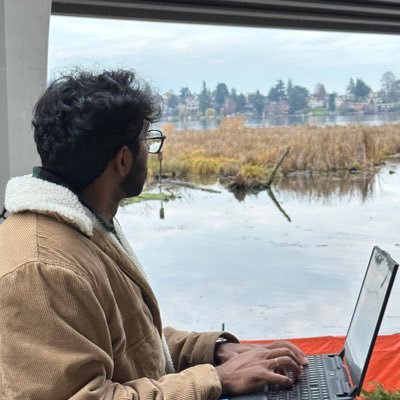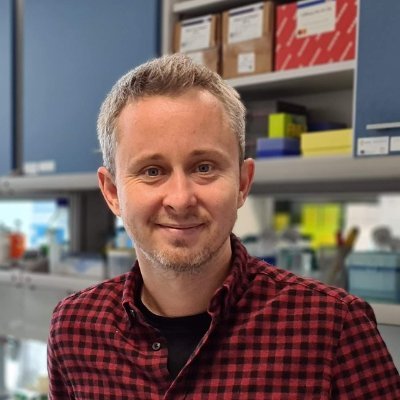
Jin Seok (Andy) Lee
@iam_js_lee
Followers
173
Following
296
Media
6
Statuses
131
PhD candidate in bioinformatics & computational biology @pirl_unc | Long-read sequencing | Neoantigen discovery
Chapel Hill, NC, United States
Joined December 2019
Introducing Exacto: long-read somatic & germline DNA and RNA variant caller, DNA+RNA variant integrator, and mutant peptide sequence predictor for neoantigen discovery. It builds on the Occam's Variant Grammar that I previously proposed. https://t.co/6rNDrWnLyT
1
1
1
Flew relatively under the radar on this app, but this preprint that came out last week clears for immunology paper of the year 📔: Genentech 🤝 BioNTech - Cross-competition shapes CD8+ T cell hierarchies and differentiation after RNA vaccination A 🧵: https://t.co/p3w6BKBaYU
biorxiv.org
Immunodominance is a universal feature of adaptive immunity that constrains T cell expansion, clonal diversity and breadth resulting in a narrowly focused T cell response. While observed across...
1
5
15
"Improving long-read somatic structural variant calling with pangenome and de novo personal genome assembly" from @lh3lh3 et al Seemingly big reduction in SV false positives! https://t.co/hZf4Muvdz0
biorxiv.org
Accurate detection of mosaic and somatic structural variants (SVs) provides early diagnostic and therapeutic evidence for cancers. While long-read whole-genome sequencing leads to more accurate SV...
1
21
57
Exacto is available here:
github.com
Long-read variant caller and integrator for DNA, RNA, and mutant proteoform prediction. - pirl-unc/exacto
0
0
0
It's always inspiring to watch Dhuvi's creativity and focus in action. Thrilled to see his ideas come to fruition in this new landmark paper. The conditionally generated T cell receptor against a tumor epitope was validated in vitro. A major step forward for de novo TCR design.
As de novo pMHC binders become commodity, the role of the wild type TCR starts to evolve. Both have their place, but lately it feels like all progress was in binders. No longer. Pleased to report that the first AI-TCR against a non-viral epitope has been achieved TCR-TRANSLATE🧵
0
0
1
A gene may template many dozens of products. Its products can have diverse, even opposing functions. Ascribing the functions of the products to the gene is a simplistic approximation that has outlived its usefulness.
8
32
215
I'll be speaking in this webinar ( https://t.co/8eJlzpInw5) on September 10, where I'll share our benchmarks and observations for Roche's SBX sequencing instrument, as well as models developed by our team for SBX data.
event.on24.com
Wednesday, September 10, 2025 at 12:00 PM Eastern Daylight Time.
1
12
51
Some tumors with many mutations are eliminated by immunotherapy, while others evade immune surveillance and eventually relapse. A new mathematical model could help us understand the complex role of mutational load in immunotherapy resistance https://t.co/El4u3uh9ZS
@ricard_sole
0
3
17
Alcohol use reduces the efficacy of anti-PD1 immunotherapy by disrupting anti-tumor immunity Paper starts from an interesting observation
4
9
71
Have you ever wondered how a somatic inversion is detected? In this Tenet-inspired blog post, I break down the telltale signs: head-to-head (5' to 5') and tail-to-tail (3' to 3') inversion breakpoints. https://t.co/mdchRypbPA
0
3
5
Update to our software for predicting tumor antigens using genomics data (LENS v1.7), done by @spvensko - Now with native package support for HLApollo, pepsickle, and RNA-only analysis (+ fixes and improvements) https://t.co/p6CXuUEYDU
@iskander @iam_js_lee @DhuviKarthikey1
0
2
5
Structural variants are an untapped source of neoantigens but their messy representation holds us back. Enter Occam's Variant Grammar: a unified variant representation for long-read guided neoantigen discovery in personalized immunotherapy development. https://t.co/f19UBkSGTR
2
7
29
After next round of the bake-off, going to pivot to tumor antigens (once we get some mass spec validation of which ones are real). For now, read the blog post by @BenjaminGVincen:
0
2
6
Took a year but today marks a very special day for @iam_js_lee and I. ACE may be used as a *teenie* part of a clinical trial. Confronted with the slim possibility of actually making a fraction of a difference and suddenly the months of sleepless nights don’t seem all that bad 🥲
1
2
7
🚨Today in @CellCellPress, we show that RNA splicing factor mutations in myeloid cancers generate splicing-derived public neoantigens targetable by #TCR tx. Amazing collaboration co-led by @AbdelWahablab, @bradleybio, and @KlebanoffLab. #Tcellpower
https://t.co/5fycZiLEWg
cell.com
Common oncogenic RNA splicing factor mutations in myeloid malignancies generate recurrent splicing-derived neoantigens, which can be selectively targeted using a T cell receptor-based approach.
10
31
141
New paper by @AmyEPomeroy! A model of intratumor and interpatient heterogeneity explains clinical trials of curative combination therapy for lymphoma Out now in Blood Cancer Discovery @BCD_AACR
https://t.co/NTWoC8qns3
#mathonc #lymsm #BloodCancer 1/n
7
8
32
Extremely excited re: IMA203 - PRAME TCR T cells Ph 1 study published in @NatureMedicine! This is a transformative Rx in #melanoma for HLA-A201+ & PD1 refractory pts. Compared to TIL, easier to make, less toxic & so far ~2x response rate in heavily pre-Rx. https://t.co/HVgl1QRQfQ
9
62
190
Scalable co-sequencing of RNA and DNA from individual nuclei
nature.com
Nature Methods - Building on a nucleosome-depletion strategy, DEFND-seq utilizes a droplet microfluidic platform to enable high-throughput co-profiling of DNA and RNA in single cells.
0
21
68
This UMAP plot was generated from data simulated without inherent clusters, meaning the observed clusters are artifacts. It highlights how default Seurat clustering and UMAP settings can sometimes produce misleading patterns in data visualization.
13
109
575
We're thrilled to present ESM3 in @ScienceMagazine. ESM3 is a generative language model that reasons over the three fundamental properties of proteins: sequence, structure, and function. Today we're making ESM3 available free to researchers worldwide via the public beta of an API
24
250
864
















